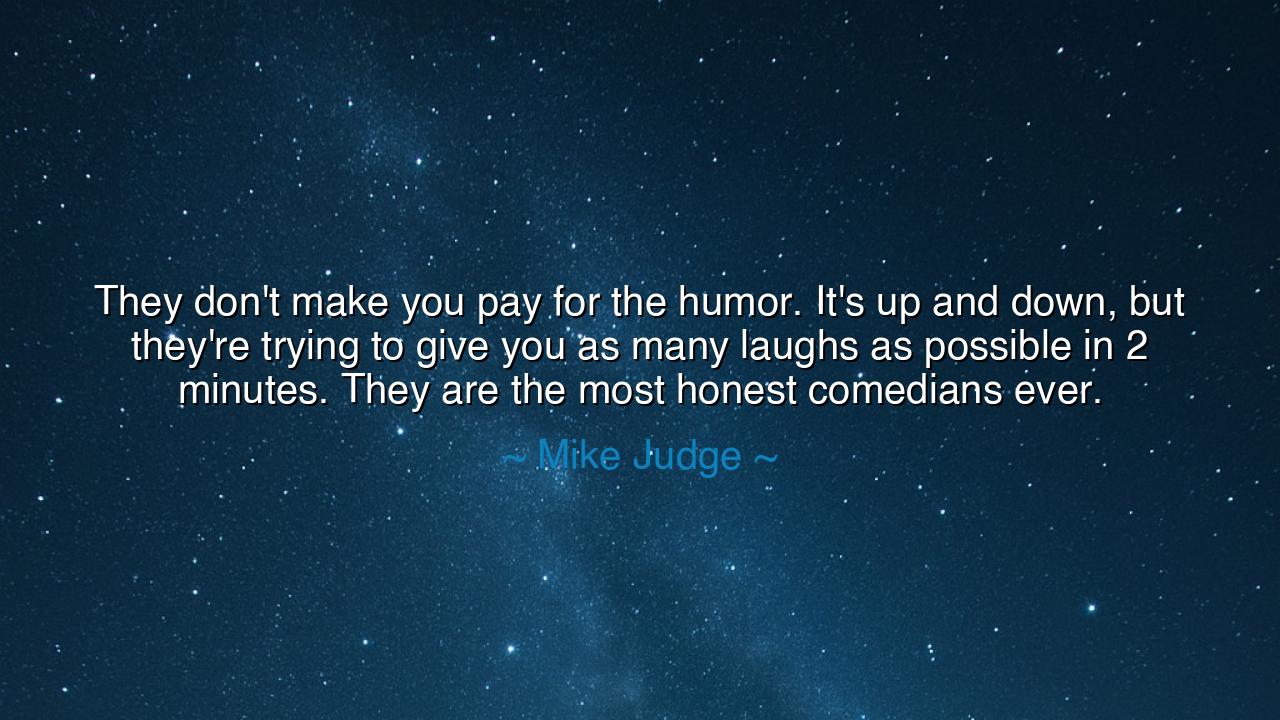
They don't make you pay for the humor. It's up and down, but
They don't make you pay for the humor. It's up and down, but they're trying to give you as many laughs as possible in 2 minutes. They are the most honest comedians ever.






The creator and storyteller Mike Judge, a man who has long peered into the soul of comedy and seen its quiet genius, once said: “They don’t make you pay for the humor. It’s up and down, but they’re trying to give you as many laughs as possible in 2 minutes. They are the most honest comedians ever.” At first, this may seem a simple praise of comedians or comic performers — but in truth, it is a reflection on purity, generosity, and truth in art. Judge speaks of a kind of humor that is free from manipulation or arrogance, that seeks not to impress but to give. In those brief, shining moments of laughter, there is no pretense, no demand, no burden — only the pure exchange between the creator and the audience.
To say that they “don’t make you pay for the humor” is to honor a sacred kind of honesty. These comedians, whoever they may be, do not seek to purchase admiration through cleverness or social commentary. They do not require the audience to endure pain before granting release. Instead, their joy is immediate — laughter offered freely, as if from one soul to another. This is the laughter of generosity, unburdened by self-importance. Judge calls them “the most honest comedians” because their purpose is clear and unhidden: they wish to make people laugh, and nothing more. In a world so often weighed down by cynicism, such honesty of intention becomes a kind of holiness.
The ancients, too, revered this form of simplicity in art. The playwright Aristophanes, in the theaters of Athens, filled his comedies not with bitterness but with mischief and joy. His laughter was direct, even crude, but beneath it pulsed an unashamed humanity. He made the people laugh at themselves, not to scold, but to remind them they were alive. His plays, like the comedians of Judge’s praise, “gave as many laughs as possible” in the brief time between dawn and dusk. For he knew, as all true humorists do, that laughter is not a transaction — it is a gift of release, a shared breath between performer and people.
When Judge speaks of humor that is “up and down,” he acknowledges another eternal truth — that art, like life, is imperfect. Laughter cannot be measured with precision; it comes in bursts and ripples, sometimes rising, sometimes faltering. Yet even when the joke does not land, the attempt itself is noble. There is honor in trying, in reaching for joy amid the absurdities of existence. The “ups and downs” of these comedians mirror the rhythm of life itself — its triumphs and stumbles, its highs and lows. Their persistence to keep giving, despite imperfection, makes their art authentic, and authenticity is the highest virtue of all creation.
Consider, too, the traveling jesters of the medieval world — the fools of the court, who dared to speak truth through laughter. They had no armor but humor, no protection but wit. Some were mocked, others revered, yet all shared one noble mission: to remind the powerful and the weary alike that laughter is the great equalizer. Their comedy was not polished or perfect, but it was real — raw, unpretentious, and honest, just as Judge describes. They “did not make you pay” because they themselves had nothing to give but heart and humor. Their laughter was their truth, and that truth, offered freely, made them immortal.
From Judge’s insight, we may draw a lesson for all who seek to create or to live meaningfully: give without demanding. Whether you are an artist, a worker, or a friend, do not calculate every gesture, every word, as an exchange. Offer joy because it is right to do so. Speak truth because it must be spoken. In laughter, as in life, sincerity is the greatest art. The comedians Judge praises remind us that the simplest acts — a story told well, a joke delivered honestly — can illuminate the darkest corners of the human heart.
And so, let us remember: honest laughter is sacred. It needs no justification, no agenda, no payment. It is the purest proof of connection — that one spirit has reached another, if only for a moment, and lifted it from the weight of the world. As Mike Judge teaches through his words, the truest creators do not trade in cleverness or pride; they trade in joy. They are the torchbearers of lightness in a heavy age. So, in your own life, seek to live as they perform — generous, unguarded, and free. For in every act of honest laughter, we come closer to truth, and in that truth, we remember what it means to be fully, gloriously human.






AAdministratorAdministrator
Welcome, honored guests. Please leave a comment, we will respond soon